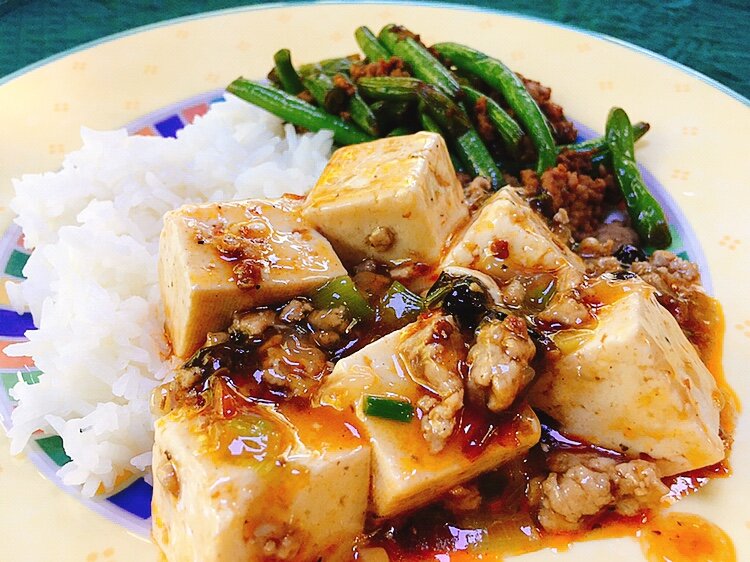Kitchen Chinese (a novel) & Mapo Tofu
As our national conversation of late has focused on the experiences of people of color, we have been asked to confront the reality that many Americans live in two different worlds, and for many, one of these worlds is the subject of horrific bias and prejudice. On the one hand, we might celebrate the “hyphens” in our society – African-American, Chinese-American, Muslim-American – as an indication of our diversity, and the fabled “melting pot” of our American experience.
And yet do we really want all of our differences, all of our cultural backgrounds to melt away? How do we balance the need to feel cohesive with the need to retain an important piece of one’s identity?
I recently read the novel Kitchen Chinese, by Ann Mah, which is the Cook the Books Club selection for June-July. (Cook the Books is a bi-monthly online book club for which people: read a book – often a novel or a memoir – that has a connection to food and cooking; cook a recipe either given in or inspired by the book; and write a blog post about it. I have twice participated so far, with The Temporary Bride and Pomegranate Soup.)
Kitchen Chinese tells the story of a young Chinese-American woman, Isabel Lee, whose life in NYC has just fallen apart: fired from her job and dumped by her boyfriend. Her older sister is a successful and powerful attorney for an American law firm in Beijing, and Isabel decides to up and move into her sister’s apartment with no plan, but with a desire to start anew. Told in the first person, the story follows Isabel as she finds her way in China, and finds herself looking like everyone else, but unable to speak Mandarin well. As she declares early in the novel, she only knows “kitchen Chinese.”
This is a lovely, enjoyable read, and while some aspects of Isabel’s life in Beijing feel a bit trivial and one-dimensional, there are meaningful reflections about her identity as a Chinese-American who, although she is Chinese, feels out of place in Beijing. Her hyphen makes her feel both Chinese and American, and yet she also feels like neither one at all, and it is this aspect of the novel that opens a window into how people grapple with these kinds of emotions.
Without giving away too much of the story, the plot does involve food and cooking, and Isabel discusses both Chinese and non-Chinese dishes. As soon as she mentioned mapo tofu, I pulled out my copy of Chinese Soul Food, by Hsiao-Ching Chou, as that recipe has had a sticky note on it for months! I made that version before I finished the book and saw that at the end of Kitchen Chinese, Ann Mah included several recipes, including mapo tofu. (Notably, these recipes are not exclusively Chinese recipes, emphasizing the author’s – and the protagonist’s – life with a hyphen.)
I served the mapo tofu along with stir-fried green beans (also from Chinese Soul Food) and rice, and it was a great dinner. But, to be honest, I didn’t love the mapo tofu. In the cookbook I used, the tofu is simmered in water and then the water and the tofu are added to the wok with the pork, aromatics, and spices. It seemed that the tofu didn’t absorb the flavors as much as I had hoped. Ann Mah’s version allows the tofu and water to simmer in the wok with aromatics for longer, and has some other differences. While I don’t have a recipe to post right now, I am definitely planning to make this again, and incorporate some aspects of each recipe, and if that amalgamation works, I’ll definitely follow up on this post!
As for me personally, I cannot say I have any personal experience living with a hyphen. Although I am Jewish, that aspect of my identity is not obvious, and, on occasion, I have certainly avoided revealing that – I have that luxury. Furthermore, my forebears had long assimilated so fully that most of the remnants of the old country had vanished before I was born. None of my grandparents spoke Yiddish or kept kosher. I certainly never had the experience that I have read from so many cookbook authors of being embarrassed or getting teased because of what was in their lunchbox. So I have no personal insights to offer, just the hope that we can all continue to read, listen, learn, and grow.
Whether because of migration or because people of different backgrounds will continue to fall in love and have children, we need to work harder to make sure people can live comfortably with who they are, with hyphens or not. Perhaps it’s naïve, but I hope that if we can gather around a metaphorical table (certainly metaphorical now, during the pandemic, but perhaps once again in the future in person) to share not only our food but stories about out different cuisines, we will give people more space not only to feel a part of a diverse community but also to feel pride in their histories.

